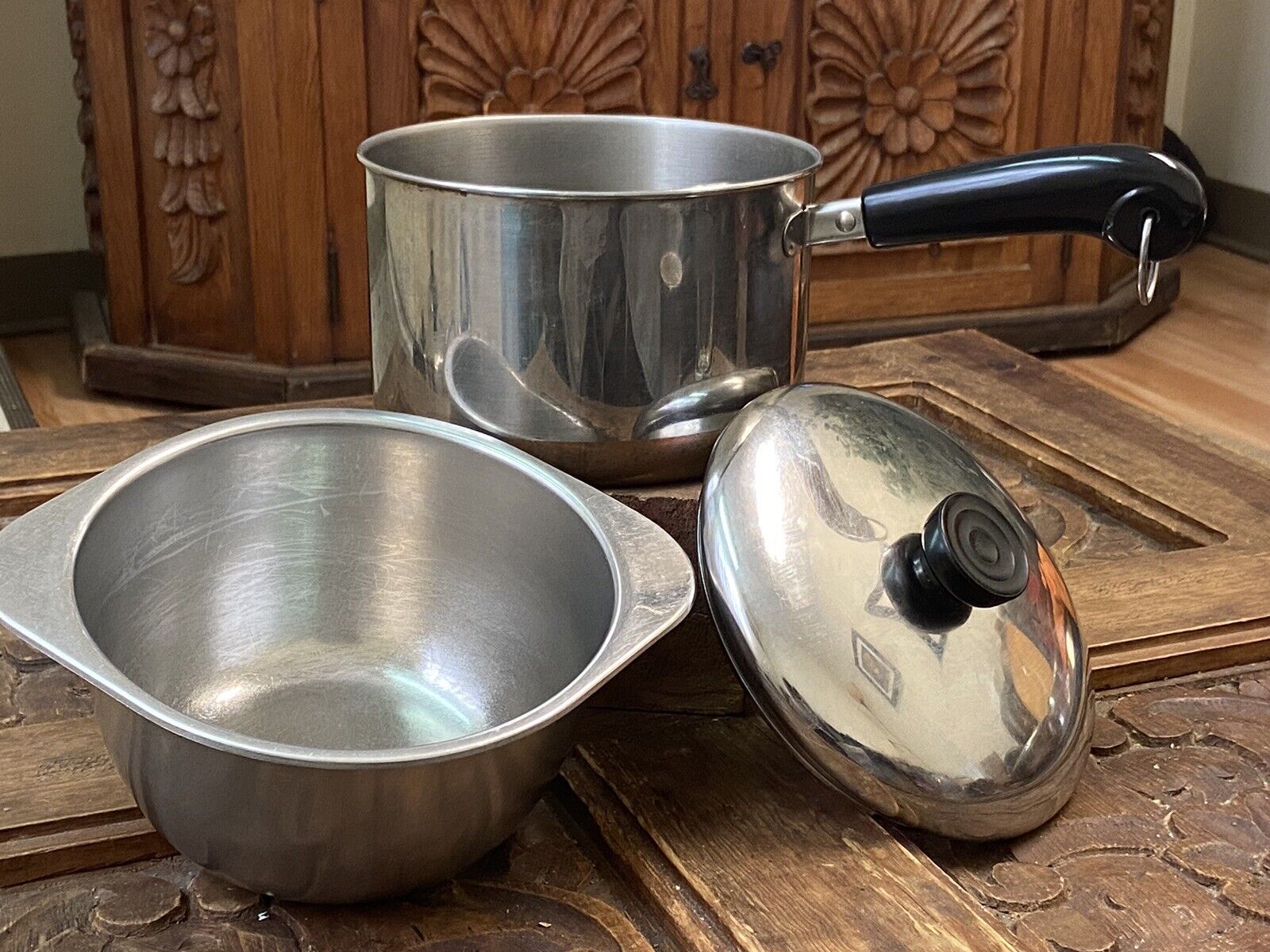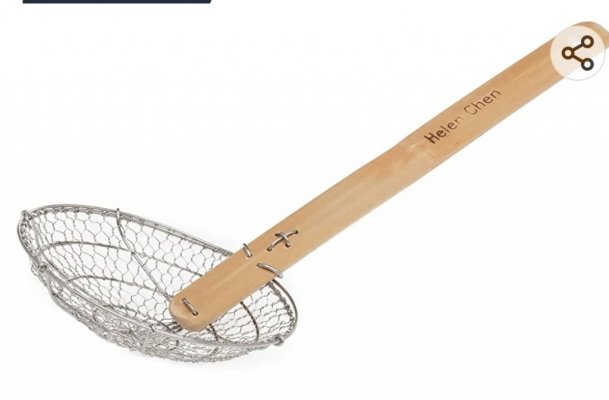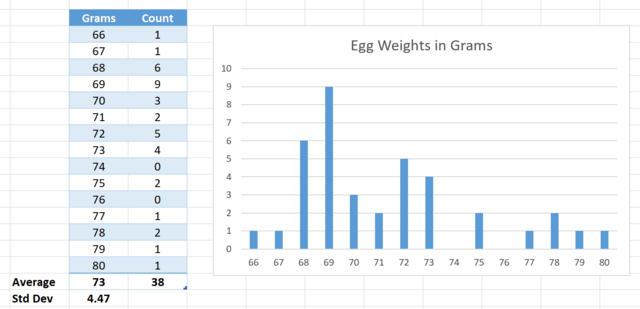Now-a-days I use a pyrex bowl over a pot, which I like better than using a stainless steel bowl. I can see the water bubbling thru the glass and know exactly what I have to do to control it. Plus it's heavier and no so liable to slip.
You are using an out of date browser. It may not display this or other websites correctly.
You should upgrade or use an alternative browser.
You should upgrade or use an alternative browser.
Foolproof boiled eggs for idiots
- Thread starter Jennifer Murphy
- Start date
The friendliest place on the web for anyone that enjoys cooking.
If you have answers, please help by responding to the unanswered posts.
If you have answers, please help by responding to the unanswered posts.
Aunt Bea
Master Chef
That's one of the reasons I like these old Revere ware pots with double boiler inserts.I used to have a double boiler. I agree, that the handle on the upper portion is handy, but the pot is still a one trick pony. I don't often do the "bain Marie" method. When I do, I use one of my stainless steel mixing bowls over a pot of boiling water. But, mostly, I use the microwave instead.
I use the inserts as informal serving/storage containers and mixing bowls. They made them in various sizes. I have a one quart and a two quart, still looking for a one and a half quart. They also made similar steamer baskets with holes in the bottom that can double as a colander. It's fun to look for them in thrift shops, fleamarkets, etc...

That's what my Mom had "Revere" not exactly like yours Aunt Bea, but close!
Double boilers were also great for keeping things warm on the stove without overcooking or making soggy.
We do have a Thrift Shop not far from here - I should go and check them out.
Double boilers were also great for keeping things warm on the stove without overcooking or making soggy.
We do have a Thrift Shop not far from here - I should go and check them out.
My mom had a set like that too. I inherited them when she pared down her cookware. I still have the 2 inserts as they fit our current heavier bottom pans we bought when we retired the Revere wear.That's one of the reasons I like these old Revere ware pots with double boiler inserts.
I use the inserts as informal serving/storage containers and mixing bowls. They made them in various sizes. I have a one quart and a two quart, still looking for a one and a half quart. They also made similar steamer baskets with holes in the bottom that can double as a colander. It's fun to look for them in thrift shops, fleamarkets, etc...

Jennifer Murphy
Senior Cook
I have been using my method and refining it. I think I have it almost perfect. I just have one little problem to resolve.
Because I drop eggs that are cold from the frig into boiling water, some of the shells crack and some of the insides leak out. I tried taking the eggs out of the frig and soaking them in warm water. That completely solved the cracking shells, but gave rise to another one.
We like our eggs with very soft yolks -- even a little runny. But now that the eggs are warmer when they go into the boiling water, the whites seem softer. My theory is that the eggs cook from the outside in. If the eggs are colder, the whites get a little more cooked before the yolks are done.
I am going to test this by only putting the eggs in the warm water for a few seconds -- just enough so they won't crack, but still get them more well done before the yolks are done.
Any comments from this group?
Because I drop eggs that are cold from the frig into boiling water, some of the shells crack and some of the insides leak out. I tried taking the eggs out of the frig and soaking them in warm water. That completely solved the cracking shells, but gave rise to another one.
We like our eggs with very soft yolks -- even a little runny. But now that the eggs are warmer when they go into the boiling water, the whites seem softer. My theory is that the eggs cook from the outside in. If the eggs are colder, the whites get a little more cooked before the yolks are done.
I am going to test this by only putting the eggs in the warm water for a few seconds -- just enough so they won't crack, but still get them more well done before the yolks are done.
Any comments from this group?
What I find helps with cracked shells is to add a bunch of salt to the water that you boil them in. I think it somehow helps mend broken shells. I swear, I have seen cracks in shells and by the time I was peeling the eggs, I couldn't find any cracks in any of the shells. It does definitely seem to help against the egg whites leaking out, from the cracked shells.
Jennifer Murphy
Senior Cook
I think I tried that. I'll try it again. ThanksWhat I find helps with cracked shells is to add a bunch of salt to the water that you boil them in. I think it somehow helps mend broken shells. I swear, I have seen cracks in shells and by the time I was peeling the eggs, I couldn't find any cracks in any of the shells. It does definitely seem to help against the egg whites leaking out, from the cracked shells.
Jennifer Murphy
Senior Cook
I'll try thatI've also heard of using vinegar in the water.
I am using a large pot that has an insert with holes in the bottom. Not sure what that is called. I can lower them gradually and see hosw that works.Do you just drop the eggs in? If so, trying lowering them in slowly on a metal spoon so it's not such a shock. Or maybe just let them sit out on counter for 10 or 15 minutes.
Thanks
Aunt Bea
Master Chef
I would continue doing what you are doing but reduce the cooking time by a minute each time until you get the desired result.
I carefully lower the eggs directly from the refrigerator into the boiling water using a slotted spoon. I’ve never had an egg crack but I have had some cracked eggs open as the cold shell expands quickly. I don’t know of any way to prevent that from happening.
I carefully lower the eggs directly from the refrigerator into the boiling water using a slotted spoon. I’ve never had an egg crack but I have had some cracked eggs open as the cold shell expands quickly. I don’t know of any way to prevent that from happening.
Jennifer Murphy
Senior Cook
Got it, thanksI would continue doing what you are doing but reduce the cooking time by a minute each time until you get the desired result.
I carefully lower the eggs directly from the refrigerator into the boiling water using a slotted spoon. I’ve never had an egg crack but I have had some cracked eggs open as the cold shell expands quickly. I don’t know of any way to prevent that from happening.
Cooking Goddess
Chef Extraordinaire
I check the eggs over for weak spots before I set them aside to boil. Once the water starts boiling, I take them back out of the fridge and lower them into the water using a spider:

I can fit three large eggs on my spider, and never cook more than six at a time, so it works for me. I almost never have a broken egg these days.

I can fit three large eggs on my spider, and never cook more than six at a time, so it works for me. I almost never have a broken egg these days.
GinnyPNW
Master Chef
The only kind of spider I want in my house!!
CG, please define "weak spots"?
I used to use a spider when I boiled eggs. Nowadays, I steam them. I lower the steamer onto the boiling water with the eggs in it.I check the eggs over for weak spots before I set them aside to boil. Once the water starts boiling, I take them back out of the fridge and lower them into the water using a spider:
View attachment 64334
I can fit three large eggs on my spider, and never cook more than six at a time, so it works for me. I almost never have a broken egg these days.
CG, please define "weak spots"?
I look for eggs where you can see fault lines. They aren't actually cracked, but you can see the lines in the shell. The lines are a slightly different color than the rest of the shell.
Cooking Goddess
Chef Extraordinaire
@dragnlaw, what @medtran49, said.
Actually, I now just realized do know what you mean. After raising my own chicken with eggs, my shells were a lot stronger. First noticed how fragile store eggs are when I moved to the city - I never thought to look for fault lines but yes, they are there.
Haven't had any crack on me while cooking here as I use an egg cooker where you puncture a hole in the fat 'air' end and that almost always prevents cracking.
Darn City chickens!
Haven't had any crack on me while cooking here as I use an egg cooker where you puncture a hole in the fat 'air' end and that almost always prevents cracking.
Darn City chickens!
So, I just get some water boiling in a small pan, drop in my eggs (2 usually) and then retire to the living room. At some point later I remember to go and turn the heat off. Occasionally, a shell will have cracked. And sometimes there is a darkish circle around the egg yolk. Neither of these things stops me using the eggs. The only thing I never do is use a non-stick pan for boiling eggs as the limescale is quite hard to remove. (Something I am having a hard time explaining to my brother who insists on using my non-stick milk pan to boil his eggs in!)
Jennifer Murphy
Senior Cook
I thought I had a foolproof method, but just encountered another problem. In my effort to avoid overcooked yolks, which I think is what causes the black/green edges, I am now undercooking the whites. I think the problem is that the size of the individual eggs varies more than I realized. I just weighed each egg in the cartons we have. This is the result:

Do I need to group them by size? The difference between a 66 gram egg and an 80 gram egg 121%.

Do I need to group them by size? The difference between a 66 gram egg and an 80 gram egg 121%.
Similar threads
- Replies
- 11
- Views
- 790
- Replies
- 17
- Views
- 892
- Replies
- 30
- Views
- 702
- Replies
- 10
- Views
- 1K
